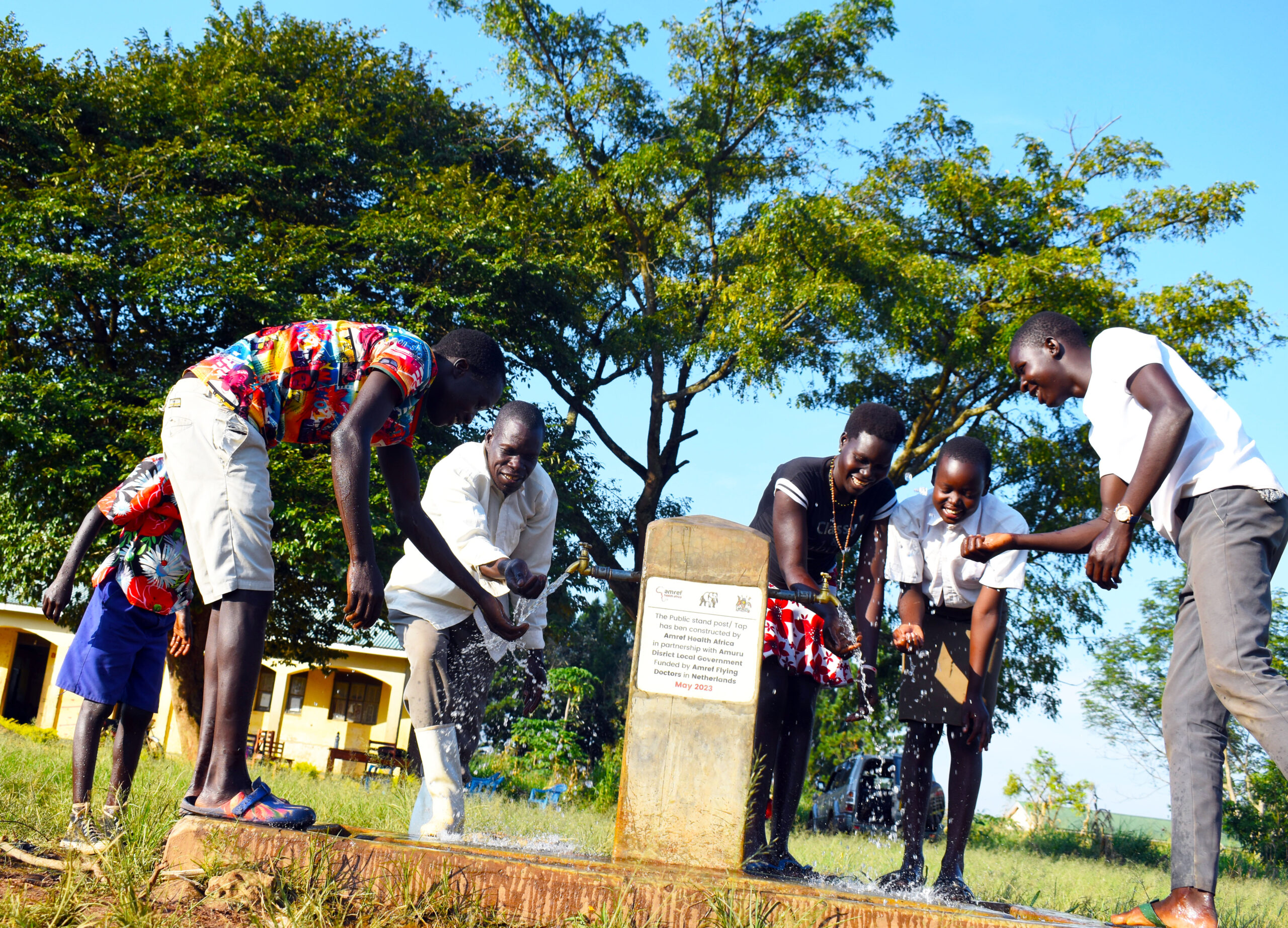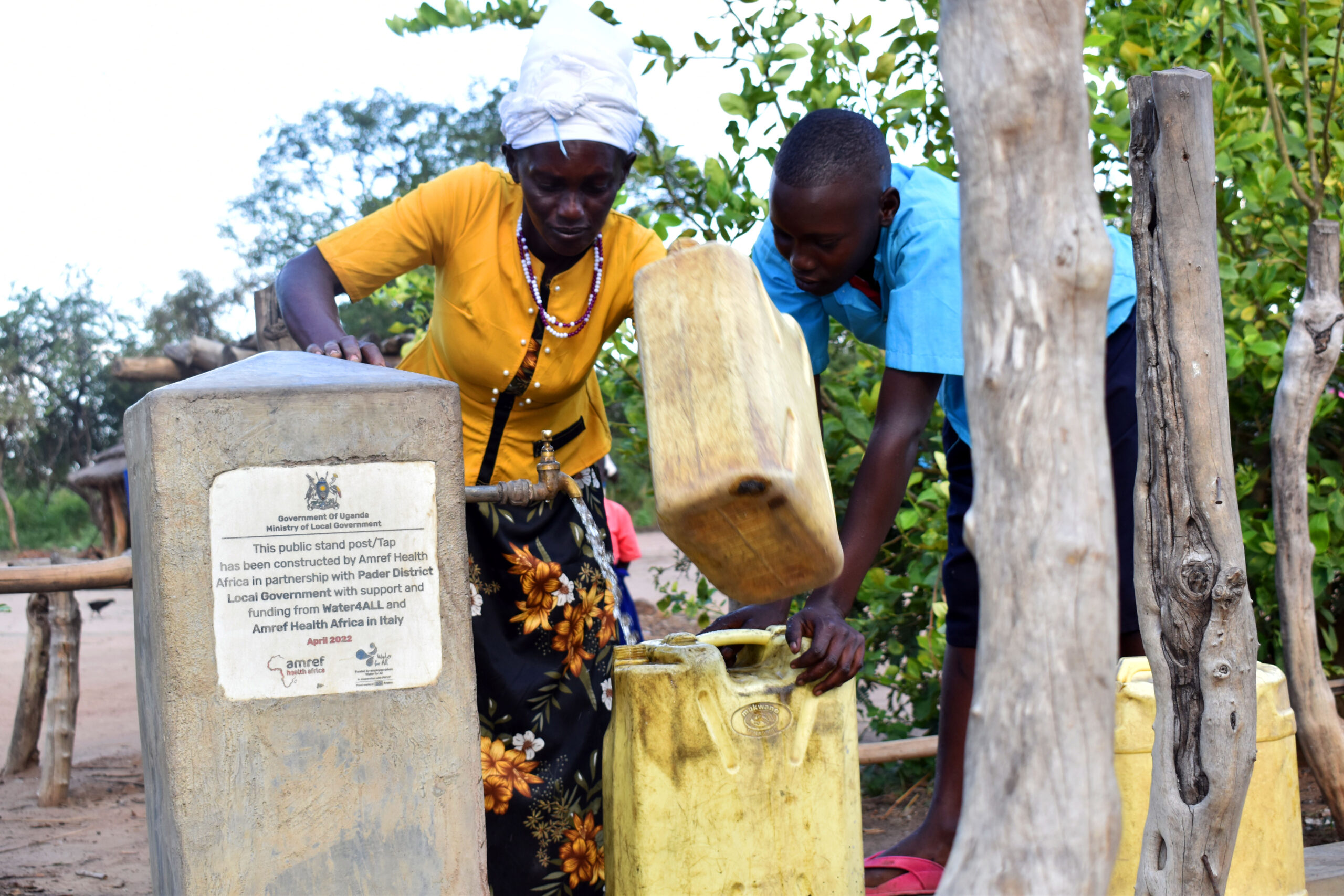Amref Advisory Council Visits The People With Disabilities Empowerment Project in Luuka District.
Tuesday, 1 October, 2024

The Advisory Council of Amref Health Africa in Uganda visited Luuka District to assess the progress and impact of the organization’s disability empowerment project. The visit aimed to provide the Council with direct insights into how these initiatives are transforming the lives of persons with disabilities (PWDs). By engaging with beneficiaries and local stakeholders, the Advisory Council then provides guidance by assessing the effectiveness of Amref’s interventions, ensuring they align with community needs, organizational strategy and deliver sustainable, inclusive solutions.
During the visit the project team shared highlights of the efforts they are undertaking in strengthening the health system in Luuka District, focusing on improving care for Persons with Disabilities (PWDs) through inclusive health services, economic empowerment, and capacity building. The various stakeholders showcased the project’s impact and the collaboration between various partners
Dr. Wandira Christopher, the District Health Officer (DHO) of Luuka District, introduced the context of the district whose population is 203,404, including 12% living with disabilities, the district has 40 health centers across government, religious, and private sectors. The project’s aim is addressing the health needs of PWDs, and build capacity of 43 health workers and undertake an infrastructure audits that were conducted to better serve this population.
Two personal testimonies from PWDs were shared, showcasing the project’s transformative impact:
Nandego Faith (Maama Faith)

A widow and caretaker of three children with disabilities, she shared how the program’s support, including health savings and encouragement, has transformed her family. Her children, once hidden, are now in school, and she expressed deep gratitude for the project’s support.
Namutmba Aida

Blind in both eyes, Aida described how her isolation was addressed through group support, including being provided with a walking cane and improved access to health care. She shared her relief at receiving pain-relieving treatments and no longer feeling despised by health workers. Ms. Kwegesa Mwajuma, the Senior Probation Officer of Luuka District, proudly shared the transformative progress of the “Missing Billions” project with the Advisory Council. As she spoke, she emphasized the profound impact the project has had on persons with disabilities (PWDs) in the community. “Through the PLA-D groups—Participate, Learn,
Act for Development—we’ve seen a remarkable increase in self-esteem among PWDs,” she noted. “Many of them now feel a renewed sense of purpose and empowerment, no longer weighed down by feelings of inferiority. The groups have created a space for unity and togetherness, fostering a sense of belonging among PWDs that wasn’t there before.”
Ms. Mwajuma further highlighted the tangible strides made in health access and economic empowerment. “With greater awareness of the health services available and reduced stigma, more PWDs are now seeking the care they need,” she said, beaming. “There has also been significant economic progress, both for individuals and the groups as a whole, as more PWDs are engaging in income-generating activities.” She also praised the improved attitudes and enhanced knowledge of health workers, who have received training to better understand and address the unique needs of PWDs. “It’s been truly heartwarming to witness the shift in how PWDs are treated in healthcare settings,” she added, hopeful about the future impact of the project.
Bukanga Health Center III
At Bukanga Health Center III, I, Dr. Ssegonga Andrew, have witnessed a remarkable transformation in how we serve persons with disabilities (PWDs), thanks to our development partners in health. In the past, our staff struggled with handling PWDs. Their care required additional time and effort, and many came with poor hygiene. We often delayed their treatment, causing frustration and bitterness, leading them to avoid our health center.
However, after receiving comprehensive training in customer handling, our team’s attitude shifted. We learned the importance of empathy, calmness, and kindness. This training opened our eyes, and since then, we’ve seen a significant increase in PWDs seeking care—from 1-2 patients a month to about 6-10 now. We even received an adjustable labor bed for mothers with disabilities, which has greatly improved care.

Despite this progress, challenges remain. Communicating with the deaf and dumb patients is difficult, and assistive devices are limited. Nevertheless, with support from partners, we conduct community sensitization, ensuring PWDs receive the care they need, even delivering medication to those who can’t travel. Our goal is to make the facility more disability-friendly, and with continued support, we are hopeful for even greater success in the future.
During the field visit, the Chair person of the Advisory Council Prof. Elizabeth Ekirapa expressed joy at the progress made, encouraged sustainability of groups, and highlighted the importance of mediation to resolve conflicts. She also raised critical questions on how to ensure sustained care for PWDs, the need to address generational poverty, and expand health service delivery to meet PWDs’ unique needs.
Eng. Aaron Kabirizi emphasized transparency in leadership and accountability within the groups to deter fraud and safeguard the future of the program and the communities. Dr. Patrick Kagurusi, Amref Health Africa Country Manager thanked all partners and local government for their collaboration and expressed hope for scaling up the project across the district. He also highlighted Amref’s commitment to inclusivity and called for feedback to improve future phases.
Despite the successes of the “Missing Billions” project, some challenges persist. One of the most pressing issues is the urgent need for funding to complete the remodeling of health centers and to acquire more adjustable equipment tailored to the needs of persons with disabilities (PWDs). Additionally, there remains a significant shortage of assistive devices, including hearing aids and white canes, which continues to hinder access for PWDs. The lack of sign language personnel further complicates efforts, limiting effective communication for those with hearing impairments and impeding their access to vital services. Addressing these challenges is crucial to sustaining the project’s positive impact.
The field visit was concluded with acknowledgments from various partners, a tour of the project enterprises, and the symbolic planting of trees as a component now integrated in all Amref projects. The need to focus on sustainability, inclusivity, and expanding the scope of the project to reach more PWDs was echoed by all.
The project has shown the potential of empowering PWDs, creating inclusive health systems, and fostering economic development. However, ensuring long-term success will require addressing the funding gaps, increasing access to assistive devices, and maintaining the collaborative spirit among all stakeholders.





Amref Health Africa teams up with African communities to create lasting health change.




Comments
No comments found.